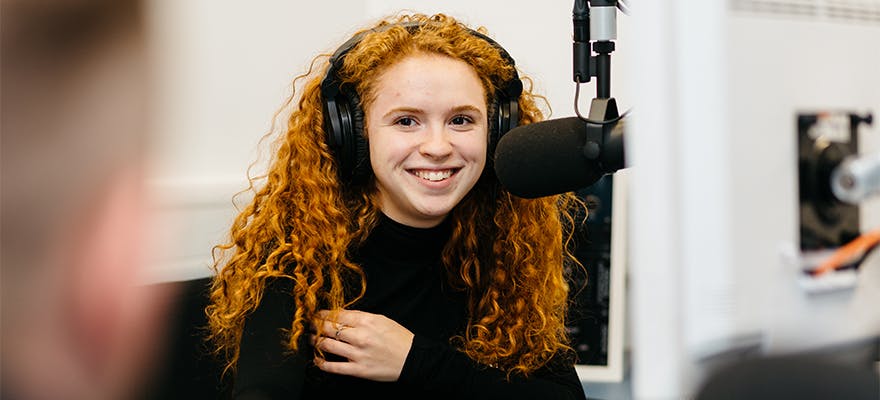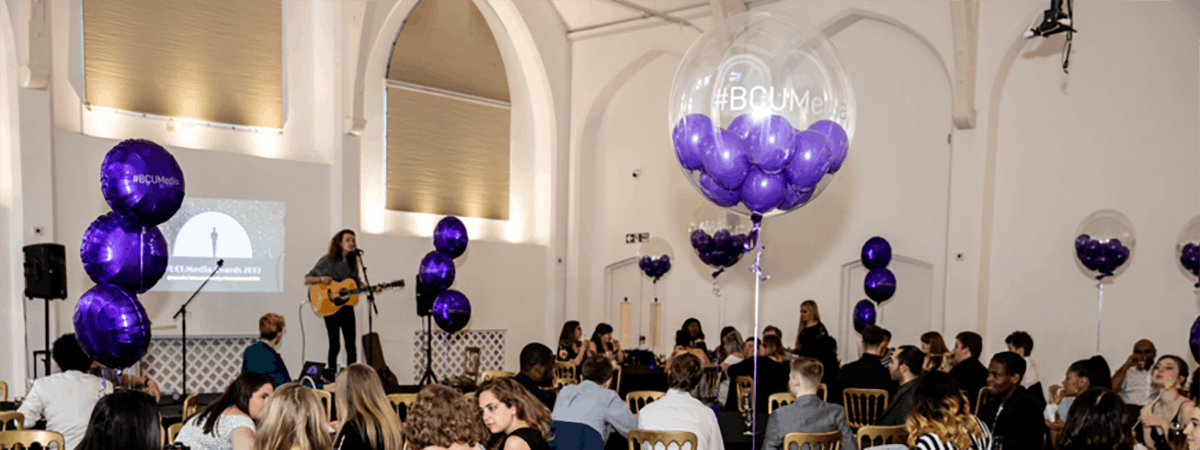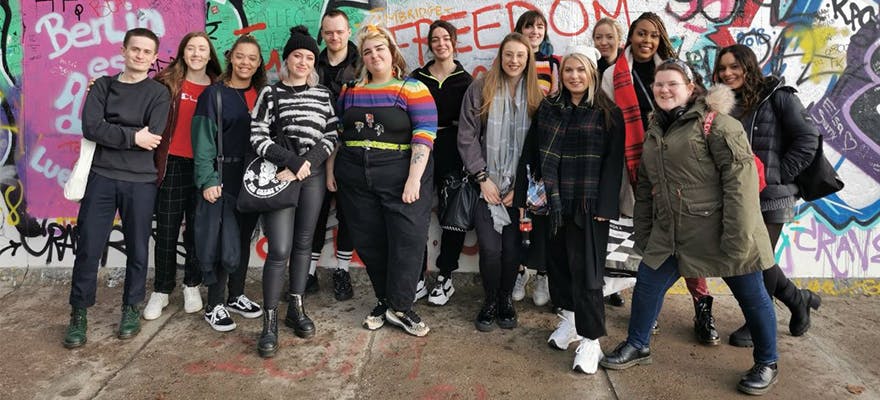Wondering how to prepare for your course, or have you got some time to kill before you start your studies? Our Course Directors have put together a list of activities you can do from home to get ready for September.

Media and Communication
Course Director: Hazel Collie
Our course is broad, so it’s difficult to point you to specific media to consume in preparation for the Media and Communications degree. That will be dictated largely by what interests you at the moment and what you think you’d like to study on our degree course. We aren’t into telling you what you should be watching, reading, using and enjoying as we want you to discover that for yourself. Instead, I would encourage you to immerse yourself in the media products that you love and then push yourself to consume some of the media that wouldn’t be your first choice. Start to think really critically about how they’ve been constructed, why those choices have been made and what they mean. Would you have made different choices? Think about why you like particular types of media over others and be honest with yourself about whether there are elements of these media products which trouble you and why this might be.
At the same time, have a read of this student blog about Media Studies and watch the video discussion of David Gauntlett’s most recent book, Making Media Studies (I’ll leave it to you to decide whether you want to watch the 30 minute video or the 7 minute one).
If you’re feeling creative and you’d like to do something to take your mind off what’s going on in the world at the moment, it would be great if you could begin to bring all your thoughts on this together in the form of a short media piece which explores why Media Studies matters to you. You can do this as a video or audio piece (on your phone if you like), as a narrated slide show, a music video with overlaid text, a web page, an infographic, a mindmap, anything else…it’s your choice. Be creative! And most importantly, take pleasure in the process.
 Media Production
Media Production
Course Director: Sam Coley
For those intending to join the Media Production course, you might like to visit the BBC Academy website and search for areas of media production that interest you. There are some excellent tips that will help prepare you for future course work - and get you thinking about professional industry practices.
To see how effective TV drama can still be produced in lockdown conditions, try watching the innovative ‘Isolation Stories’ on ITV. This four part series shows how life can be for people living in lockdown – and can be seen via the ITV Player.
To see how a radio reporter works from home, check out this blog from one of our graduates Laura Sanders.
A simple ‘task’ to work on before joining the course could be to establish your own online blog and write some entries about media subjects that you’re passionate about (a favourite television or Netflix show, radio presenter, band etc.), or report on how you’re dealing with the lockdown. Creating a YouTube channel to host any video work you’ve produced would be useful too - or possibly try making your own podcast. Any of these would be valuable preparation for the Media Production course.
 Foundation degree in Media
Foundation degree in Media
Course Director: Ellie Tomsett
Try something new!
The Foundation Programme in School of Media will cover a lot of different media forms so try and push yourself out your comfort zone a bit. A good way to get started with this is to ask your friends and relatives for recommendations of things they enjoy that you have not heard/read/ watched/ played. Then get to work engaging with their suggestions and ask yourself some questions such as….
- If their favourite kinds of media are different to yours, why might that be?
- Does what we enjoy relate to other people (e.g. are these solo media pursuits [reading a book] or group activities [watching a film in the cinema, going to a gig] or maybe could be both [online gaming]?)
- When there are many options out there how do we make decisions about what we watch/ listen to/ play/ read?
 Music Industries
Music Industries
Course Director: Matt Grimes
It could be a video shared on a social media platform, an article from a music blogger, a music magazine (print or online) or a music new site, even an opinion from an influencer. Right now, every person within the music industries, with a profile and a platform, is doing their best to keep going and to keep connecting with their fans, audiences and other industry professionals. So, if you find an article or social media post interesting, save it and we will come to discuss these when we start the course in September.
Music is everywhere and it is inextricably linked to our own psyche and sense of being, so for music to just disappear in light of the ongoing challenges it is facing, is highly unlikely. The music industries are facing some very tough challenges at the moment, but this is not the first time that the music industries has faced a shift in how music is produced, distributed and consumed. The advent of digital, such as the mp3 , social media sites, augmented reality and virtual reality, holographic live performances, streaming content and direct to consumer digital sales has thrown up some work practice challenges that the music industries has adapted to, and moved forward with, so it will rise to the challenge and do so again. If you join us later this year, you will be developing your awareness and understanding of the music industries, locally, nationally and globally across all platforms, so try and use the time you may have now to gather together examples of interesting, innovative and creative content you come across.
I am sure you are already a big follower of music and music culture and have favourite channels of your own, but you might want to visit websites such as Music Week, Complete Music Update, or blogs such as Music Industry Blog or Music Business Worldwide, as a way to tap into news, updates and debates from the music industries. You could also try music sites such as The Quietus, Pop Matters or GRM Daily. Perhaps you can find one or two examples of music industries stories that catch your eye? They can be related to the current situation, or be on a completely different topic, but have a look and choose something that inspires you. What is it about and why did it interest you? What does this tell us about the music industries? What, if anything makes it innovative or just a different or new way of doing things? What can we learn from this?
If you can practice asking and applying these questions now, we will have a lot to kick of our discussions when we are all together at the start of semester one!
One final suggestion… if you are on Twitter follow us on @BcuMusic and when you arrive in September we will sign you up to our closed Facebook group too.
 Public Relations and Media
Public Relations and Media
Course Director: Philip Young
The importance of clear, consistent communications has never been more sharply in focus than it is now, so too is the need for organisations to inform and engage their audiences. If you join us later this year, you will be developing your awareness and understanding of effective communications, across all platforms, so try and use the time you may have now to gather together examples of interesting content you come across.
It could be a video shared on a social media platform, an infographic providing advice or sponsored content from an influencer. Right now, every person and brand with a profile and a platform is doing their best to keep going and to keep speaking with the people that matter to them. So if you find an article, advert or social media post interesting, save it and we will come to discuss these when we start the course.
To start you off, you might want to visit websites such as PR Week and Famous Campaigns as a way to tap into news, updates and debates from the world of public relations. Perhaps you can find one or two examples of PR stories and campaigns that catch your eye? They can be related to the current situation, or be on a completely different topic, but have a look and choose something that inspires you. Who created it? What did they do it for? Who were they trying to reach? What impact did it have?
If you can practice asking and applying these questions now, we will have a lot to kick of our discussions at the start of semester one!
One final suggestion… if you are on Twitter, Instagram or Facebook, search for BCU Media but also #BCUWeArePR and give us a follow.
We read from books each week for all modules. If you’ve made it through the rest of the list and still have some time to kill, why not dive into three of our core textbooks, explaining what journalists need to know and consider to produce quality journalism.
 Journalism (all specialisms)
Journalism (all specialisms)
News to read over the summer
- Subscribe to our newsletter, Heads Up, to see examples of great news highlighted by the BCU Journalism lecturing team!
- Huffington Post UK - our partners in the Huffpost Centre For Journalism at BCU
- The Guardian
- Birmingham Live - our biggest local newspaper, and where some of our Journalism graduates are working.
- Birmingham Eastside - the website you will be reporting for whilst studying. Take a look at what our journalism and media students have been creating.
- BBC Sport is another great one to check out if you’re planning on studying Sports Journalism, and if Music Journalism is more your speed then be sure to visit Music Week. Fashion and Beauty Journalism specialists should take a look at Business of Fashion and Drapers.
News to watch over the summer
Pay attention to who is speaking and why? What makes the story interesting? Or NOT?
Local
- Your local ITV News bulletin – 6pm every weeknight
- Your local BBC News bulletin – 6.30pm every weeknight
National/international
- BBC News at 6pm and 10pm
- ITV News at 6.30pm and 10pm
- Channel 4 News at 7pm
- 5 News at 5.30pm and 6.30pm
- BBC News Channel or Sky News on the start of any hour – what’s the top story? How do they handle it?
Core study books to buy and read
Buy these three: they are the core texts to get you through this entire course, the first two are written by one of our Journalism lecturers, Paul Bradshaw:
- Mobile-First Journalism: Producing News for Social and Interactive Media, Steve Hill and Paul Bradshaw
- The Online Journalism Handbook: Skills to survive and thrive in the digital age, Paul Bradshaw
- McNae's Essential Law for Journalists, Mike Dodd and Mark Hanna. Media law is essential if you want to be a journalist.
Specialist books to read
You could get these second hand, but as soon as you enrol and get your BCU ID you can access them for free through our library.
- Sports - Digital Sports Journalism, Charles M. Lambert
Stay up to date
Finally, make sure you check out our Twitter, Instagram and Facebook pages to keep up with the latest happenings from Birmingham School of Media.




